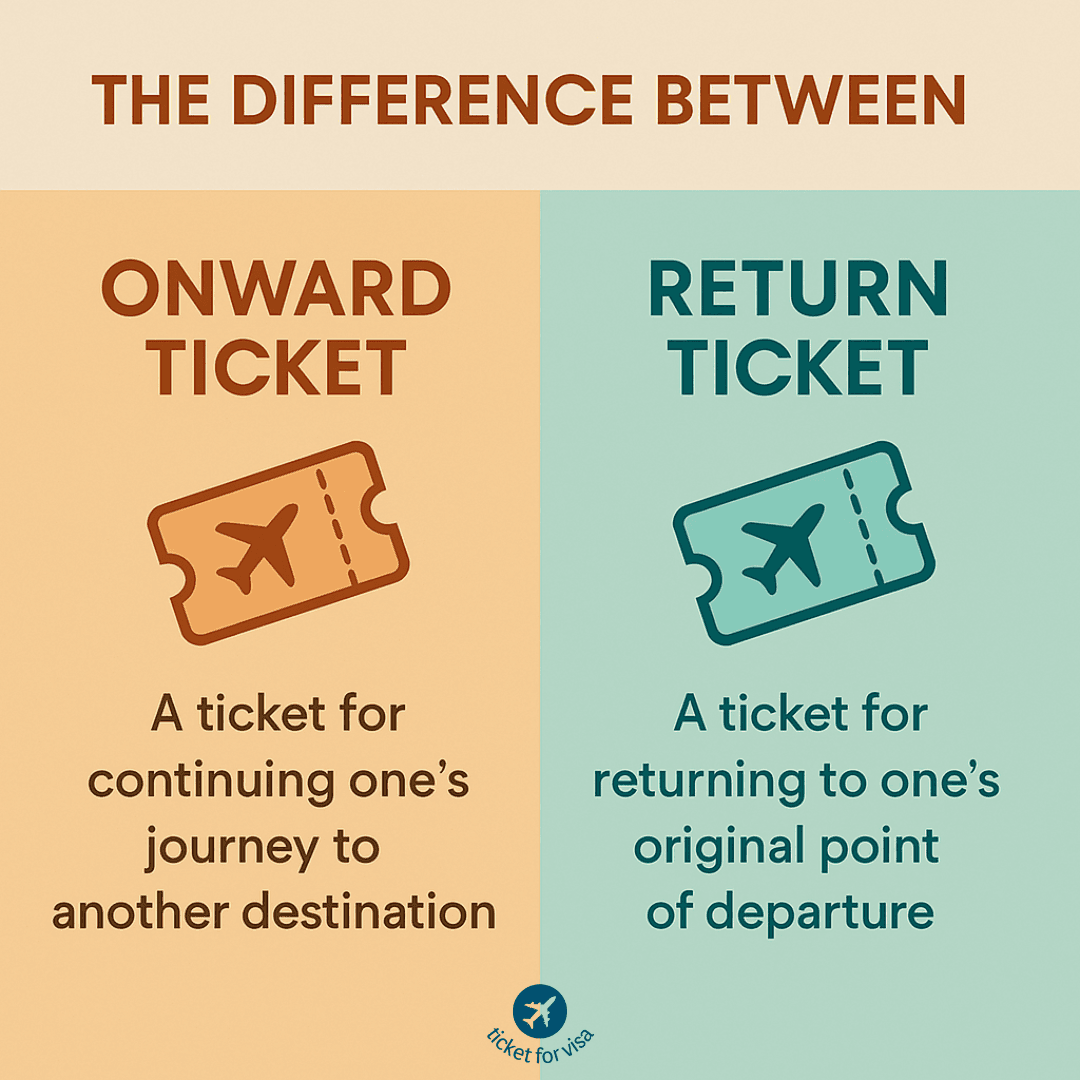Onward Ticket vs. Return Ticket: What’s the Difference and Which One Do You Need for Your Visa?
return ticket • June 2025

When preparing for international travel—especially when a visa is involved—travelers often encounter the terms onward ticket and return ticket. While they might sound similar, they serve different purposes and are required in different contexts. Understanding the distinction between the two can help you avoid unnecessary visa complications or being denied boarding at the airport.
In this article, we’ll break down what each term means, when and why you might need one, and how to get the right kind of travel documentation for your situation.
What Is an Onward Ticket?
An onward ticket is proof that you plan to leave the country you are visiting. It doesn’t have to be a flight back to your home country—it could be a ticket to any third country. The key is that it shows immigration authorities and airlines that you do not intend to overstay your visa or permitted duration of stay.
For example, if you're flying from Germany to Thailand and plan to continue your journey to Vietnam afterward, a flight from Bangkok to Hanoi would count as your onward ticket.
Many countries—especially in Asia, South America, and parts of Africa—require proof of onward travel upon entry or before boarding your flight. Airlines often enforce this rule, as they are responsible for ensuring that passengers meet immigration requirements.
What Is a Return Ticket?
A return ticket is a round-trip ticket that brings you back to your country of origin. This is the standard type of ticket used by most tourists and business travelers who have a fixed travel schedule and intend to return home after their trip.
For example, if you're flying from Paris to New York and back to Paris, your return ticket covers the full round-trip journey.
Return tickets are especially relevant for visa applications that require clear evidence of your travel plans, such as Schengen visas or tourist visas for countries like the United States, Canada, or Australia.
Key Differences Between Onward and Return Tickets
Feature | Onward Ticket | Return Ticket |
Direction | Leaves the destination country | Returns to the country of origin |
Flexibility | More flexible, allows open travel routes | Fixed route back to home |
Visa use | Common for visa-free/short stays | Preferred for full tourist visa applications |
Immigration acceptance | Widely accepted, especially in Asia | Universally accepted |
Typical use case | Backpackers, long-term travelers | Short trips, business, or family travel |
When Do You Need an Onward Ticket?
Onward tickets are typically required when:
Entering a country that offers visa-free or visa-on-arrival access but wants proof that you will leave within the allowed stay duration.
You don’t yet know when or where you’ll go after your trip, and you don’t want to commit to a full return itinerary.
You're applying for a visa that allows flexible onward travel rather than a strict round-trip itinerary.
Common destinations that often require proof of onward travel include Thailand, Indonesia, the Philippines, Mexico, Colombia, and Peru.
When Is a Return Ticket Required?
A return ticket is often preferred or required when:
You're applying for a formal visa (e.g., Schengen, US B2, UK Standard Visitor) that requires a full itinerary and proof of ties to your home country.
Your trip has fixed dates and destinations.
You’re returning to the same country after a short-term visit abroad.
Visa officers may view a return ticket as stronger proof of your intent to leave the destination country and return home.
What If You Don’t Want to Book a Real Return Yet?
For travelers on flexible or long-term itineraries, booking a full return ticket can be expensive or impractical. Fortunately, temporary onward tickets are a widely accepted alternative for visa applications and check-ins.
Services like ticketforvisa.com offer legitimate, verifiable flight reservations that can be used as proof of onward travel. These are not fake tickets—they are real flight bookings with booking references (PNRs) that are valid for 24 to 48 hours.
This allows you to meet visa or immigration requirements without paying for a fully refundable or cancellable flight.
Whichever of the two you need, make sure you’re prepared before you fly—so you can focus on enjoying your trip, not stressing over documents at the airport.
